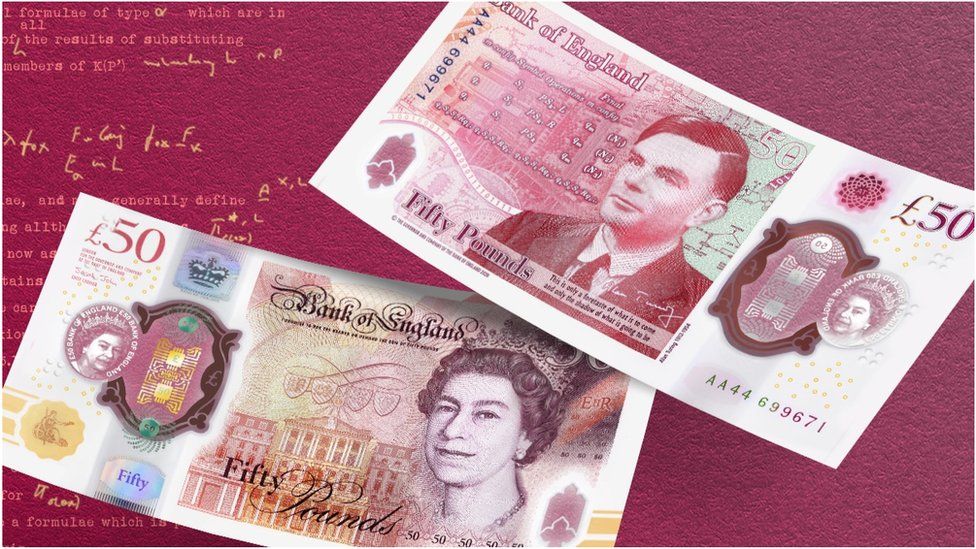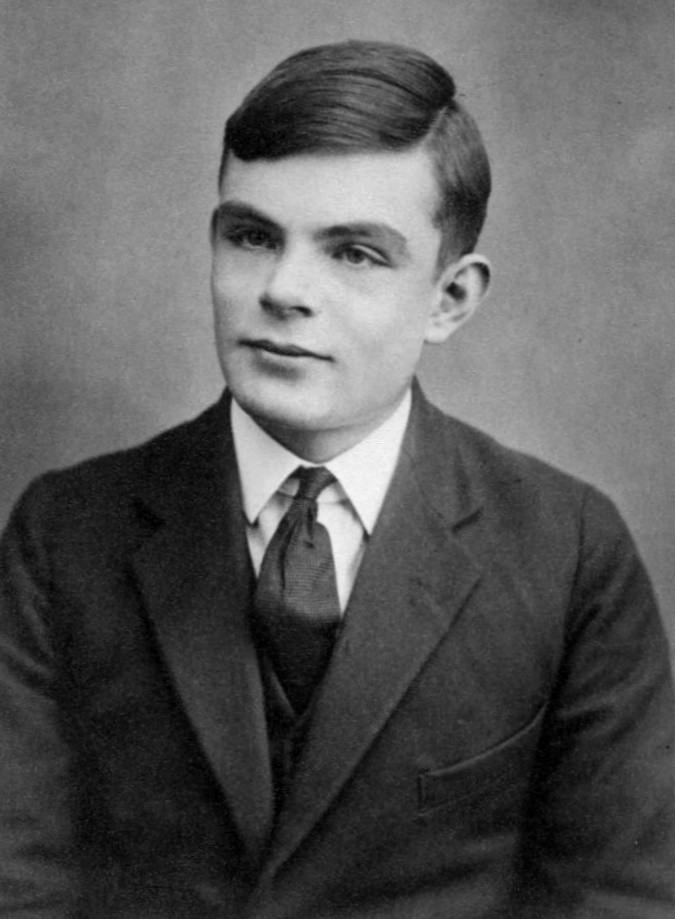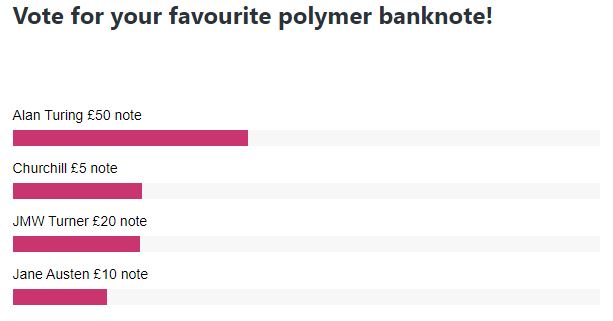Posts Tagged ‘Alan Turing note’
Alan Turing – The Face of the £50 Note!
In 2019, The Bank of England revealed Alan Turing as the new face of the £50 banknote.
In their search to find an eminent British scientist to feature on the £50 note, a total of 227,299 nominations were sent to The Bank of England. 989 eligible characters were narrowed down to a shortlist of just 12 before Turing was finally selected.
Change Checker is so excited to reveal that today the design of this BRAND NEW £50 note has been officially confirmed by The Bank of England.

In keeping with Turing’s code-breaking legacy, this brand new £50 has been declared as the most secure yet.
What features on the new £50 note?

This brand new banknote is FULL of exciting features. Including:
- A photo of Turing from 1951 which is part of the National Portrait Gallery’s collection
- A table and mathematical formulae from Turing’s 1936 paper “On Computable Numbers, with an application to the Entscheidungsproblem”
- A design of Turing’s trial model of his famous Automatic Computing Engine (ACE) Pilot Machine
- Technical drawings for the British Bombe, one of the primary tools used to break Enigma-enciphered messages
- A quote from Turing, from an interview in The Times newspaper (June 1949): “This is only a foretaste of what is to come, and only the shadow of what is going to be”
- His signature from the visitor’s book at Max Newman’s House in 1947 which is on display at Bletchley Park
- Ticker tape depicting Alan Turing’s birth date (23 June 1912) in binary code.
In addition to these amazing design features, there are of course a series of security features, similar to those we’ve seen on our £5, £10, and £20 polymer notes, including holograms and see-through windows.
GCHQ Collaboration
In recognition of Turing’s code-breaking expertise, the Bank of England have collaborated with GCHQ on the intelligence and cyber agency’s toughest puzzle ever – based on the Turing £50 bank note design.
GCHQ’s Turing Challenge is a set of 12 puzzles that have been put together by intelligence staff at GCHQ, where problem solving and a diverse mix of minds are at the heart of its work to help protect the UK from increasingly complex threats
Who was Alan Turing and why is he being featured on a £50 note?

Alan Turing was most famously known for accelerating Allied efforts to read German Naval messages enciphered with the Enigma machine.
His work is said to have been key to shortening World War Two and saving millions of lives.
In addition to his work during World War Two, Turing played a pivotal role in the development of early computers, first at the National Physical Laboratory and later at the University of Manchester.
In 2013, he was given a posthumous royal pardon for his 1952 conviction for gross indecency.
Speaking of the new note, Andrew Bailey, the governor of the Bank of England, said: “Turing was a leading mathematician, developmental biologist, and a pioneer in the field of computer science. By placing him on our new polymer £50 banknote, we are celebrating his achievements, and the values he symbolises.”
Polymer Notes

This brand new £50 note is the last in the Bank of England’s collection to switch from paper to polymer, following the popularity of the polymer £20, £10 and £5 notes.
The banknote will enter circulation on 23 June, which would have been the mathematician’s birthday.
Alan Turing £50 note voted as Change Checker’s favourite polymer note!
As the brand new £50 note is the last in the Bank of England’s collection to switch from paper to polymer, we asked you to vote for your favourite polymer note.
The results are in!

The Alan Turing £50 has been revealed as Change Checkers’ favourite polymer banknote, taking over 40% of the votes!
We’re certain collectors will be eager to add this banknote to their collections when it’s released later in the year. Will you? Let us know in the comments below!
Don’t miss out on the very latest UK coin releases!

Join the Change Checker UK CERTIFIED BU Subscription Service and receive new UK coins sent to your door without the hassle of placing orders on the day of release!
Simply choose the perfect subscription for you here >>
Face of the Fifty Pound Note REVEALED!
This morning The Bank of England revealed Alan Turing as the new face of the £50 banknote, which will be released into circulation in 2021.
In their search to find an eminent British scientist to feature on the £50 note, a total of 227,299 nominations were sent to The Bank of England. 989 eligible characters were narrowed down to a shortlist of just 12 before Turing was finally selected.
Codebreaker Alan Turing will be on Britain’s new 50-pound currency https://t.co/PcmHWkqre3
— TIME (@TIME) July 15, 2019
Other candidates included Rosalind Franklin, Stephen Hawking, Ernest Rutherford and Mary Anning to name a few.
The Bank’s chief cashier, Sarah John said, “The strength of the shortlist is testament to the UK’s incredible scientific contribution. The breadth of individuals and achievements reflects the huge range of nominations we received for this note and I would like to thank the public for all their suggestions of scientists we could celebrate.”

About Alan Turing
Alan Turing is perhaps best known for his outstanding code-breaking which was vital to the Allied victory in WWII.
However, he was also considered a pioneer in computer sciences and the development of the early computer. His work has had an enormous impact on our lives today.
The Bank of England governor, Mark Carney said, “Alan Turing was an outstanding mathematician whose work has had an enormous impact on how we live today. As the father of computer science and artificial intelligence, as well as [a] war hero, Alan Turing’s contributions were far ranging and path breaking. Turing is a giant on whose shoulders so many now stand.”
Sadly, in 1952 he was prosecuted for homosexual acts and died in 1954 from cyanide poisoning. It was determined that his death was an act of suicide.
The new note
Next year the new £20 polymer note will be issued, featuring British Artist, JMW Turner.
This will be the third UK banknote to be made from polymer and will be swiftly followed by the new £50 note in 2021, thus completing the UK’s changeover to plastic banknotes.
These notes are more durable, secure and environmentally friendly than paper notes.

The future of cash
There have been debates in recent years as to whether or not Britain should become a cashless society.
The rise of card and electronic payments means that many see cash as becoming obsolete, with the 1p and 2p coins at the heart of the debate.
In addition to this, the validity of the £50 note has also been questioned, as it is rarely used in everyday payments and is widely thought of as being used by criminals.
The good news for Change Checkers is that the Treasury have confirmed that cash will be around for years to come.
And, with the introduction of the new Alan Turing £50 note in 2021, I think it’s fair to say that cash is still king.
If you’re interested in coin collecting, our Change Checker web app is completely free to use and allows users to:
– Find and identify the coins in their pocket
– Collect and track the coins they have
– Swap their spare coins with other Change Checkers
Sign up today at: www.changechecker.org/app


